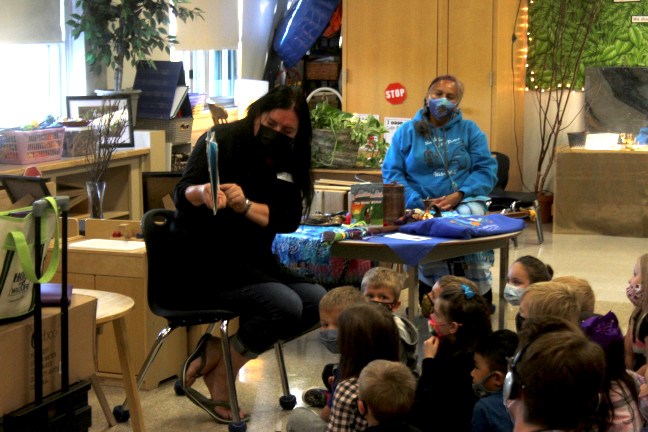Lakehead University’s Niijii Indigenous Mentorship Program brought its first ever Water Walker Day to Westmount Public School on Sept. 23 as part of Science Literacy Week in Canada.
Part of the event featured a reading of a book titled The Water Walker written by Joanne Robertson, and based upon the life of Josephine Mandamin, the Anishinaabe Water Warrior and Water Walker who led walks around all five of the Great Lakes to bring awareness to the importance of water, water science and the threats pollution and climate change have upon this vital resource.
“The book itself is called Water Walker, we chose that book, because it portrays indigenous science as well as Indigenous culture, and it brings the important message of water, and how we need to protect it and keep it clean and have it for our future generations,” said Lisa Harris, Niijii Indigenous Mentorship Coordinator.
“The author wanted the book in both languages just to ensure that there’s access to Indigenous peoples throughout this area as well as around the world, and it’s important because it attaches that culture, that language to the water, it makes it more of a living thing than what we just refer to as water.”
The event highlighted the importance of including Indigenous voices and perspectives when it comes to educating Canada’s youth.
“I think it’s important that, of course, when you probably talk about water at some point in school, but it’s important that we bring the indigenous component,” Harris said.
“It’s a great step toward reconciliation, but it’s also just opening kid’s eyes, and understanding that water is a real thing, and there’s a lot of studies that show that the more you talk to water, you pray to water, you can improve it, and if you’re cleaning up the garbage, and your taking responsibility every day, you make a better place and better water.”
The other half of the event featured traditional teachings from Sheila Decorte, a local Water Walker and Fort William First Nation Elder. Decorte led students in a song for the water and taught the children the importance of water.
“In 2017 I joined Nokomis on her last Water Walk, which was started in Spirit Mountain in Duluth, and ended in Matane, Quebec, I wasn’t there the whole time, I was there in the beginning and at the end, but from that experience, I was inspired to become a Water Walker, and start my own Water Walk here in Thunder Bay,” Decorte said,
“Because of everything that’s been going on with the rivers here in Thunder Bay with a lot of our Indigenous youth being found in these rivers over the years, I’ve really felt that these rivers are hurting, there’s a living spirit that lives in these rivers, and lives in all water, and I really felt that these rivers were hurting because of what’s been going on, and I had this little tap, that I needed to do something.”
Decorte, also named Neebing Gimiwan, started her Water Walk at Loch Lomand and committed to performing the Water Walk for four years.
The first year, Decorte and her group approached Loch Lomand from the south and carried water from the lake and poured some of the water into each of Thunder Bay’s rivers they walked by, The second year, they approached the lake from the west, the third year they approached the lake from the north, and on the fourth year, they approached the lake from the east.



